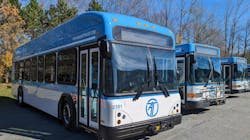Advance Transit’s electric buses receiving positive feedback in first month of operation
Advance Transit’s (AT) first set of electric buses started operation March 13. The new electric buses were funded primarily by federally administered grants and financial incentives from Green Mountain Power (GMP).
AT began the process of acquiring electric buses in 2019 when the agency was awarded grant funding from the Vermont Agency of Transportation (VTrans) through support from the U.S. Department of Transportation. Some key objectives for the agency were to expand the benefits of vehicles into rural communities, help eliminate carbon emissions and combat climate change.
“Vermont has challenging climate goals, and we will need all of our partners to electrify their respective services as quickly as practical. The Public Transit Program recognizes AT as a leader in transit services and operations, and these electric buses are an extension of the dedication and commitment to provide more affordable, reliable and cleaner mobility options to their communities,” said Ross MacDonald, VTrans public transit manager.
The agency says rider feedback has been positive, with some riders noting a much quieter ride, and bus operators noting a smoother driving experience.
AT is also in the process of building an electric charging infrastructure that is slated to finish in the fall of 2023. GMP’s incentives also helped with the installation of a Level 3 fast charger. The project is the most significant facility upgrade since AT’s building expansion in 2009. This addition to the operations center will accommodate the current electric vehicles, as well as future ones, laying the groundwork for further electric bus acquisitions and supporting long-term goals for more sustainable business practices.
“It is exciting to see more Vermont communities served by clean electric buses. Driving with fossil fuel is the No. 1 source of carbon emissions in Vermont – so cleaning up the transportation sector makes a big difference for our state. Plus, all GMP incentives and programs are designed to help reduce costs so all GMP customers can benefit,” said Tiana Smith, who leads electrification programs at GMP.
AT has long-regarded sustainability and environmental stewardship as key parts of the organization’s mission. AT began incorporating hybrid buses into its fleet in 2011 and currently uses electric cars as driver relief vehicles for buses in service. It has implemented systems that both reduce operating costs and produce real environmental benefits. For example, AT actively harvests rainwater that is used to wash buses. AT’s LEED-certified facility also features a solar array and a system for recycling used motor oil into a heat source.
“This is only the beginning,” said AT Executive Director Adams Carroll. “We’re excited about the impact electric buses will have on the community and the overall effects on the environment. We look forward to growing the number of electric vehicles in our fleet over time.”
More electric vehicles are slated to arrive by 2024.
